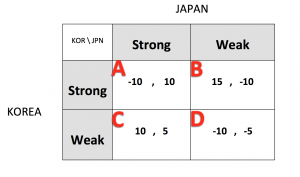Dokdo/Takeshima Dispute and Game Theory
Dokdo/Takeshima, a small islet located at a sea surrounded by Korea, Japan, and Russia, has long been a region of hostile dispute regarding its territorial sovereignty. Due to its political, economical, and military values, Dokdo/Takeshima is strategically crucial to both South Korea and Japan for each nation’s benefit/advantage in various aspects. Arguing in legal and historical means in terms of which country should claim sovereignty in the islet, such questions as ‘which nation first discovered the territorial land or water,’ ‘whether a particular country legally transferred the land or sea into its own sovereignty,’ and ‘which state actually exercised sovereignty over the particular land or water’ (The Dokdo/Takeshima Dispute, 367) arouse to the surface.
However, the problem is that while disputing, each country is proposing different (and also opposite) interpretations for the same data. Korea’s assertions in terms of historical evidence are the following: (1) according to some of the oldest Korean historical texts, Samguk Sagi(512), Sejong-Sillok Jiriji(1454), and Dong’guk Yeoji Seungnam(1531) it is mentioned that Dokdo had already been claimed as Korean territory. (2) According to The Dokdo/Takeshima Dispute paper by Jinman Cho, Heemin Kim, Jun Young Choi, when World War II had come to an end and Japan suspended administrative control over its colonized territories, ‘the first president of Korea, Syungman Rhee, announced the Presidential Declaration on the Territorial Waters in 1952, which drew the so-called Peaceline including Dokdo on the Korean side.(368)’ The Japanese opposition has its position supporting the following notion: (1) the evidence from Korean historical records are not directly referring to the present-day Dokdo/Takeshima. (2) Japan took control over the islet while Korea uninhabited the islet during the 17th century. (3) the San Francisco Peace Treaty of 1951, which determined the territories belonging to the Korean peninsula, did not mention Dokdo/Takeshima specifically. (4) the New Korea-Japan Fishery Treaty in 1998 set Dokdo/Takeshima as a neutral zone, which in fact is an abandonment of the Korean exclusivity in Dokdo/Takeshima.
Factors deriving such huge international discrepancies, in regards to the utility-aspect of the islet Dokdo/Takeshima, include the Emotional Utility and the Utility based on non-emotional, substantive issues. Koreans have long had drastic negative sentiments towards Japan historically, which in Japan is much less severe counterwards. Therefore, the mission of maintaining the sovereignty of the disputed island is very essential to the spirit and the morale of the Korean nation. Furthermore, Dokdo/Takeshima is well-known among East-Asian countries for its high values in fisheries, ecology, geology, ocean-science, environmental research, military, and seabed resources. Due to such vast range of benefits, both nations would not stand back to negotiate easily.
Taking all the factors into consideration, both countries have had to make choices whether they should react to the Dokdo/Takeshima issue strongly or weakly, and this is where I would like to apply the game theory.
Before we analyze the game theory chart, we need to recognize that cases B and D are highly unlikely because the possibility that Japan will take strong actions toward the Dokdo/Takeshima issue is dominant. Since the islet itself is currently under physical control of the Korean government, there is no reason for Japan to weakly react to the issue because they have nothing to lose. According to Jinman Cho and his two other co-authors, the Korean government established the Dokdo Research Institute on August 14, 2008, in order to launch a direct research about Dokdo at a governmental level. There has also been ‘a growing demand among Korean people to exercise sovereign rights including building an ocean hotel, developing a village for the residents, and exploring seabed resources.’ There are already Korean navy forces and a guard post located at the islet. Moreover, the Korean government constructed a monument in 1953, a lighthouse in 1954, a chopper landing facility in 1981, a radar facility in 1993, an anchoring facility in 1996, and allowed citizens to settle there in 1980. Considering these current indications of Dokdo/Takechima being a part of Korean territory, Japan is definitely taking strong actions such as taking the issue to the International Court of Justice.
Case A: While it is likely that Japan will take strong action, it is not likely that Korea will respond to this with a strong reaction. The referenced paper mentions that ‘Korea finds no reason to start negotiations with Japan over this territory and is unwilling to accept any proposal that deprives it of absolute sovereignty and control over Dokdo.’ Remaining still and maintaining the current physical control is possibly the best option Korea has.
Case B: This case, where Korea takes strong actions about the issue and Japan reacts weakly, is highly unlikely because Japan would definitely not let Korea consolidate its physical sovereignty over the islet Dokdo/Takeshima. And recognizing the fact that Korea is unwilling to make the dispute an international issue, it is also unlikely that Korea takes a strong action unless Japan responds weakly.
Case C: This case is the most likely case that reflects the current circumstances. The Dominant Strategy of Japan is acting strong, and thus the following strategy that Korea should choose is weak actions.
Case D: This case is also not likely since either one of the countries will take strong action if the other country takes weak action. Dokdo/Takeshima is an area of strong competition and thus at least either one of the countries will take strong action.
Reference: https://www.academia.edu/26641497/The_Dokdo_Takeshima_Dispute_between_Korea_and_Japan_Understanding_the_Whole_Picture

